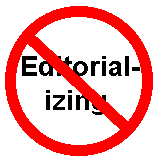
You know what journalism should be: balanced, unbiased reporting that presents facts clearly, concisely, and without comment. Journalism should not advocate a position or provide an opinion. It should allow you the dignity to make up your own mind based on the facts. Unfortunately the traditional one-way mass media seems to have abandoned the idea of journalism. Witness the explosive growth of sensationalist, tabloid, blow-dried and checkbook "journalism." Want to do something about it? Here's a practical do-it-yourself solution: grassroots news reporting by ordinary people turned citizen-journalists.
The one-way mass-media now seems more interested in using their position to tell you what to think than in fairly reporting the news. Often they do this by "creating the news," deciding what you should hear about or not hear about. Often they ignore real, important stories for marketing reasons or to promote a particular political agenda. With the advent of the Internet this paradigm is completely obsolete. There's no reason the news can't be reported by you -- using the Internet. All that's really needed are a collection point and guidelines for fair and objective reporting. The guidelines aren't a mystery either. What journalism should be has long been known.
I won't kid you; this type of writing can be difficult. Understanding the material you're covering requires some effort. But I think the benefits are clear. As readers, we need and deserve carefully researched, accurate information to better understand what's going on in the world. Objective reporting can help us form a more meaningful view of the world. It enables us to make better informed personal decisions.
By doing this we will be radically changing our world. What we perceive to be "our world" won't be determined by faceless corporate bigwigs, marketing gurus, or advertising sales directors. Instead it will be faithfully reported by us, driven only by a desire for quality.
It's time again for the news to provide balanced, complete information that lets the reader make up his or her own mind. It's time to take back the news.
Jeff Chan
Internews is a Internet project for grassroots news and feature reporting. The single goal is to showcase high-quality, minimally-biased journalism written by anyone on the Internet. Articles can cover any subject that a newspaper or magazine might carry. Daily news articles are preferred, and they should contain 750 to 1500 words. Features may be longer. All articles accepted for consideration are posted to the alt.journalism.objective Usenet newsgroup.
Internews' goal is to provide a high-quality source of unbiased, neutral, balanced news reporting. We claim that with training, you can produce journalism equal or superior to the traditional one-way mass media. In doing so we will also be reclaiming ownership of "our world."
Quality means open-minded coverage of all sides of an issue, consistently checked facts, accountable sources, and to the extent humanly possible, judgment-neutral tone, style and content. It's essential to be able to put aside personal interests and report the news calmly and dispassionately.
Neutrality includes giving equal coverage to all interests and not characterizing any position negatively or positively. News itself should not in any way advocate a position or state or imply a conclusion. It should simply present unbiased information and allow the reader to form his or her own conclusions. Anything less is patronizing and a disservice to the reader.
Balance means seeking and presenting a broad range of perspectives. If the subject of an article takes a position, get the other side of the story and present it honestly.
Quality of writing is important, but second to intellectual honesty and careful research.
Articles may be edited.
Internews may be set up as a non-profit corporation. Payment may be made in the form of stock grants to authors and developers, and residual value may be distributed in the form of stock dividends.
Since the articles will be distributed at no charge over Usenet, value will likely be derived from archive searches or content-organized subscription services. For example, personal searches up to 12 a day could be free, but high volume or commercial searches could be charged a fee. We intend to offer both context-based subscriptions and a searchable archive organized according to scientific theories of knowledge.
We may follow a GNU-like model where articles may be redistributed freely so long as the original articles are unchanged and authors and sources are credited. That way external users/group/companies could find their own ways to add value to the content we produce.
All submissions accepted will get the following copyright notice:
This article is Copyright (c) 1999 by the author. By submitting the article, the author grants the moderator a license to post the article to the alt.journalism.objective Usenet Newsgroup and to make it available in a searchable archive. Articles may be redistributed freely so long as the original content is unchanged and authors and sources are credited.
If your site doesn't currently get alt.journalism.objective, ask your system or news administrator to add it. Tell her the "newgroup" command has already been issued to create it.
Articles are also available in searchable form at the Internews web site: http://www.internews.com/
Here are some basic rules of journalism, in particular for news articles. This is a draft document. Comments are welcome.

Copyright (c) 2001 by Jeff Chan. All rights reserved.
Version 2.01: 4/26/99
Jeff Chan